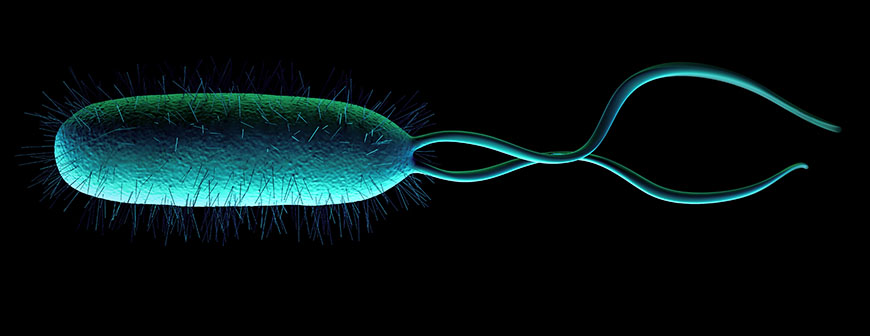
It is estimated that nearly 60 percent of the world’s population carries Helicobacter pylori (H. pylori), a gram-negative bacterium that has been categorized as a class 1 carcinogen. Although a great majority of infected individuals will probably never develop symptoms or complications from the pathogen, an infection increases the risk of gastric cancer, as well as many other illnesses such as peptic ulcer disease and gastritis.
H. pylori infection is currently treatable with antibiotics, but there is a growing concern about the threat of antibiotic resistance. According to Dr. Pushkar Lele, assistant professor in the Artie McFerrin Department of Chemical Engineering at Texas A&M University, this could become a major concern.
“Once someone contracts H. pylori it can persist lifelong unless the individual undergoes a combinative antibiotic course,” Lele said. “As bugs become more and more resistant to antibiotics, we might have a situation where a class 1 carcinogenic pathogen gains multidrug resistance. That is a medical nightmare in the making.”
Lele, along with Dr. Arul Jayaraman, holder of the Ray B. Nesbitt Chair in the chemical engineering department, has received a High Impact High Risk Awards grant from the Cancer Prevention and Research Institute of Texas to study a different approach to fighting H. pylori infections. The team, led by Lele, will study the flagellum – a string-like appendage that enables a bacterium to swim, and investigate its role as a sensor for mechanical cues that originate within the host.
According to Lele, understanding the process of sensing and how it promotes host colonization will provide vital insights that may help prevent H. pylori infections and avoid the possibility of increasing antibiotic resistance. This leads to the question of whether it is possible to manipulate or interfere with the sensing process without applying a strong selection pressure. And if the host can be camouflaged by interfering with sensing pathways, the bug could be defeated without triggering its defense mechanisms.
This study will look at two main questions. First, do H. pylori flagella act as mechanical sensors? Second, does the sensing trigger the secretion of toxins and/or other virulence factors that facilitate infections?
To answer the first question, Lele and his group will employ several microscopy-based mechanical stimulation assays and advanced image analysis techniques to measure functional-changes in single-motors of live H. pylori cells. The experiments are anticipated to reveal the mechanistic principles that govern the ability of cells to detect suitable habitats within the host.
Subsequently, Jayaraman and his team will grow gastric epithelium cells in vitro to test if mechanical sensing by the flagella leads to increased production of toxins and infection by H. pylori. According to Jayaraman, the collaboration between his group and Lele’s is a perfect combination of fundamental mechanistic studies and their application to problems in human health. Jayaraman adds that as Lele’s group comes up with different models to explain flagellar sensing in H. pylori,they will test them in an in-vitro model system, and the results will feed back to revise the hypothesis and models.
Ultimately, Lele and Jayaraman hope that a greater understanding of the mechanosensing properties of H. pylori will lead to a treatment that eliminates the reliance on antibiotics and that prevents the onset of gastric cancers.